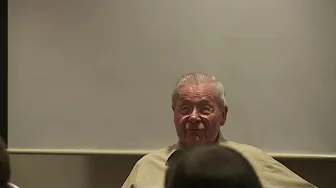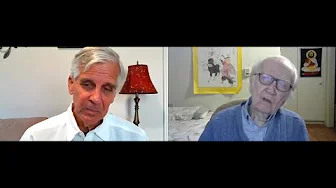Introduction - Christianity in Process: Joining God in World Solidarity
- Part 1a - Authority, Atonement, Abortion, and a Big Hug - Thomas Jay Oord
- Part 1b - The New Evangelicals - Tim Whitaker
- Part 2a - Theology in Process - Catherine Keller
- Part 2b - Panentheism, Pluralism, & Ecological Civilization - Andrew Schwartz
Part 3 - Divine Relationality - John Cobb
- Part 3a - Flowing with the Living God - Donna Bowman
- Part 3b - The Becoming of a Lutheran Queer Eco-Process Theologian from North Dakota - Jacob Erickson
- Part 4a - Aesthetic Religion - Jon Gil
- Part 4b - The Mighty Thor & God the Butcher - Ryan Does
Part 5 - The Kingdom of God - John Cobb
- Part 5a - Theology in an Event-Filled World - Joseph Bracken
- Part 5b - Process Theology Q&A - Thomas Jay Oord
Part 6 - Life After Death - John Cobb
- Part 6a - Everyday Mysticism & the Wisdom of Brother Lawrence with Carmen Butcher & Mike Morrel
- Part 6b - Confronting Whiteness - Ben Boswell
* * * * * * *

July 6, 2022 By Tripp Fuller
What a treat! Joseph A. Bracken, SJ, is back on the podcast! He is an emeritus professor of theology at Xavier University and one of my favorite philosophical theologians. I even wrote a chapter about him in my last book.
In the conversation we discuss…
- how he found the work of Whitehead in his journey as a Jesuit scholar
- the problems with Whitehead according to Bracken… Societies and the need for a stronger communitarian picture of life
- What is the problem of the One & Many and the process approach
- how does Bracken envision a Trinitarian God-World relationship
- Bracken’s reflection on Pope Francis and how it resonates with a Process-Relational framework
- the changing relationship between religion and science over church history
- the predicament of scientism
- how to think ethically about our planetary crisis
- Tripp discusses the 3 things he would add to the Christian canon
- the need for a new worldview beyond the conflict of religion and science
- Bracken’s the Church as Dynamic Life-System
- how Bracken uses the Trinity to think through a for of deep religious pluralism
- Bracken’s new book – Reciprocal Causality in an Event-Filled World
- a Process vision of the Cosmic Christ
- Bracken’s Spirit Christology and field theory
- the problem of evil and suffering
- what Bracken has learned about the relationship between faith and doubt
- Tripp tells Joe how much he loves him.
- an amazing intro to God by Bracken – God: Three Who Are One
Podcast with Tripp Fuller & Joseph A. Bracken
Previous Conversations with Bracken
* * * * * * *
Shorts by Joseph A. Bracken
* * * * * * *
Titles by Joseph A. Bracken
Jul 14, 2017
Drawing on the wisdom and teaching experience of highly respected theologians, the Engaging Theology series builds a firm foundation for graduate study and other ministry formation programs. Each of the volumes—Scripture, Jesus, God, Anthropology, and Church—is concerned with retrieving, carefully evaluating, and constructively interpreting the Christian tradition. Comprehensive in scope and accessibly written, these volumes, used together or independently, will stimulate rich theological reflection and discussion. More important, the series will create and sustain the passion of the next generation of theologians and church leaders. The word God, said Martin Buber decades ago, is the most heavy-laden of all human words. None has become so soiled, so mutilated. Twenty-first-century discourse and action often perpetuate that lack of reverence. In this volume Joseph Bracken shows us a better way.
• He begins with Christianity’s roots in Judaism and the inherent struggle to explain the reality of three persons in God who is one.
• He allows readers to engage in the lively and fruitful trinitarian debates of the early church and discover how the classical doctrine of the Trinity has shaped the church through the centuries.
• He offers a solid theological treatment of the history of the doctrine of God and its relevance for Christians today—for dialogue between Christian men and women, between Christianity and other religions, and between religion and science.
Systematic theology at its best, God: Three Who Are One helps us find unexpected unity and consensus in a world full of troubling differences. Along the way, Bracken urges us to pray as well as think and to let rational reflection lead to praise and worship, thereby giving the doctrine of the Trinity its due reverence and care.
Mar 1, 2009
“If someone were to ask,‘Where is God?’ how would you respond?”
Joseph A. Bracken, SJ, uses this question as a springboard to introduce the process-relational metaphysics of Alfred North Whitehead and other process theologians as he tries to reconcile the sometimes-conflicting views of traditional Christian doctrines and the modern scientific world. To present this material in an accessible manner to a wider audience, Bracken reworks Whitehead’s “model” of the God-world relationship, showing that God is involved in an ongoing, ever-changing relationship with humans and other . He also discusses the work of other contemporary theologians to help Christians come to terms with their role in our multi-dimensional pluralistic society.
Bracken examines divine and human creativity, the collective power of good and evil, divine providence and human freedom, prayer, altruism, and the basic question, “What is truth?” He shows how Whitehead&rsqio;s process thought approach to these issues can in fact "harmonize" traditional Christian beliefs and contemporary culture, benefiting both faith and reason.
Understanding the God-world relationship subtly influences our attitude toward ourselves, toward other human beings, and indeed toward all of God’s creatures, says Bracken. His revision of Whitehead's metaphysical vision in terms of a cosmic community shows how modern views of the world and God can be accepted and kept in balance with the traditional biblical views found in the Christian faith and how this balance can help Christians make better choices in a world shaped both by contemporary natural science and by traditional Christian spirituality.
“If we truly believe that in God we live and move and have our being and that as a result we share with the divine persons in a deeply communitarian way of life together with all of God’s creatures, we may be more readily inclined to make the periodic sacrifice of personal self-interest so as to pursue the higher good of sustained life in community. In the end, it is simply a matter of seeing the ‘bigger picture,’ realizing what life is ultimately all about.”
Apr 1, 2012
Albert Einstein is often quoted as saying that "God does not play dice," claiming an orderly and predictable structure to the universe. Today, advances and presumptions in the field of quantum mechanics pose a serious challenge to such a position. It's a challenge not only for nuclear physicists, but also for Christian theologians who work to explain God's providence for the world.
In Does God Roll Dice? noted Jesuit scholar Joseph Bracken claims that something like "directed chance" (Teilhard de Chardin) is God's normal mode of operation in a world always perilously poised between order and chaos. Bracken adopts the relatively new concept of self-organizing or self-correcting systems out of the natural and social sciences to deal with controversial issues in the ongoing religion and science debate. At the same time he deliberately keeps the language and context of the book suitable for the intelligent non-professional reader.
During the Middle Ages, philosophers and theologians argued over the extramental reality of universal forms or essences. In the early modern period, the relation between subjectivity and objectivity, the individual self and knowledge of the outside world, was a rich subject of debate. Today, there is considerable argument about the relation between spontaneity and determinism within the evolutionary process, whether a principle of spontaneous self-organization as well as natural selection is at work in the aggregation of molecules into cells and the development of primitive forms of life into complex organisms. In Subjectivity, Objectivity and Intersubjectivity, Joseph A. Bracken proposes that what is ultimately at stake here is the age-old problem of the relationship between the One and the Many, universality and particularity on different levels of existence and activity within nature.
Bracken rejects traditional models of this relationship, wherein either the One or the Many is presupposed to have priority over the other. He instead suggests that a new social ontology—one that is grounded in a theory of universal intersubjectivity—protects both the concrete particularity of individual entities in their specific relations to one another and their enduring corporate reality as a stable community or environment within Nature.
What emerges is a bold reimagining of the sometimes strained relationship between religion and science. Bracken's clear writing, sophisticated philosophical analysis, and exemplary scholarship will lend this new work an enthusiastic appreciation by readers with deep interests in philosophy and philosophical theology.



























No comments:
Post a Comment